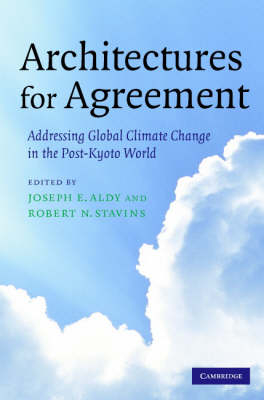
Architectures for Agreement
Cambridge University Press (Verlag)
978-0-521-87163-1 (ISBN)
With increasing greenhouse gas emissions, we are embarked on an unprecedented experiment with an uncertain outcome for the future of the planet. The Kyoto Protocol serves as an initial step through 2012 to mitigate the threats posed by global climate change. A second step is needed, and policy-makers, scholars, business people, and environmentalists have begun debating the structure of the successor to the Kyoto agreement. Written by a team of leading scholars in economics, law, and international relations, this book contributes to this debate by examining the merits of six alternative international architectures for global climate policy. Architectures for Agreement offers the reader a uniquely wide-ranging menu of options for post-Kyoto climate policy, with a concern throughout to learn from past experience in order to maximize opportunities for future success in the real, 'second-best' world. It will be an essential reference for scholars, policy-makers, and students interested in climate policy.
Joseph E. Aldy is Fellow at Resources for the Future in Washington, DC. He also served on the staff of the President's Council of Economic Advisers where he was responsible for climate change policy from 1997–2000. Robert N. Stavins is Albert Pratt Professor of Business and Government at the John F. Kennedy School of Government at Harvard University, Massachusetts. He is also Director of the Harvard Environmental Economics Program and Chairman of the Kennedy School's Environment and Natural Resources Faculty Group.
List of figures; List of tables; Foreword Lawrence Summers; 1. Introduction Joseph Aldy and Robert Stavins; Part I. Targets and Timetables: 2. Formulas for quantitative emission targets Jeffrey Frankel; Commentaries on Frankel: 2.1 Targets and timetables: good policy but bad politics? Daniel Bodansky; 2.2 Incentives and meta-architecture Jonathan B. Wiener; 3. Graduation and deepening Axel Michaelowa; Commentaries on Michaelowa: 3.1 Alternatives to Kyoto: the case for a carbon tax Richard N. Cooper; 3.2 Beyond graduation and deepening: towards cosmopolitan scholarship Joyeeta Gupta; Part II. Targets and Timetables: 4. Fragmented carbon markets and reluctant nations: implications for the design of effective architectures David G. Victor; Commentaries on Victor: 4.1 Incentives and institutions: a bottom-up approach to climate policy Carlo Carraro; 4.2 The whole and the sum of its parts: comments on David Victor's 'Fragmented Carbon Markets and Reluctant Nations' Sheila M. Olmstead; 5. Credible foundation for long-term international cooperation Warwick J. McKibbin and Peter Wilcoxen; Commentaries on McKibbin and Wilcoxen: 5.1 Commentary on McKibbin and Wilcoxen Richard Morgenstern; 5.2 Commentary on McKibbin and Wilcoxen Jonathan Pershing; Part III. Coordinated and Unilateral Policies: 6. A multi-track climate treaty system Scott Barrett; Commentaries on Barrett: 6.1 Beyond Kyoto: learning from the Montreal protocol Daniel C. Esty; 6.2 Climate Favela: a comment on Barrett Henry D. Jacoby; 7. Practical global climate policy William A. Pizer; Commentary on Pizer: 7.1 Comment on Pizer James A. Hammitt; 7.2 Comments on practical global climate policy Juan-Pablo Montero; Part IV. Synthesis and Conclusion: 8. Epilogue Thomas Schelling; 9. Lessons for the international policy community Joseph Aldy and Robert Stavins; Index.
| Erscheint lt. Verlag | 10.9.2007 |
|---|---|
| Zusatzinfo | 13 Tables, unspecified; 6 Line drawings, unspecified |
| Verlagsort | Cambridge |
| Sprache | englisch |
| Maße | 152 x 229 mm |
| Gewicht | 740 g |
| Themenwelt | Naturwissenschaften ► Biologie ► Ökologie / Naturschutz |
| Wirtschaft ► Volkswirtschaftslehre ► Mikroökonomie | |
| ISBN-10 | 0-521-87163-8 / 0521871638 |
| ISBN-13 | 978-0-521-87163-1 / 9780521871631 |
| Zustand | Neuware |
| Haben Sie eine Frage zum Produkt? |
aus dem Bereich


